Dear readers,
2015 has been declared the International Year of Soils by the 68th UN General Assembly. Talking about soils also means taking into consideration a strong nexus: with water, energy, food, biodiversity and ecosystems including their services. The global pressure on land use is extremely high, and the corresponding conflicts demand solutions.
From the perspective of the so-called bioeconomy, soil is a key resource par excellence. We look forward to our second "fireside chat" on 29 January 2015 in Berlin as part of the "Discussion forum ecosystem services", of which 'Biodiversity in Good Company' is one of the organizing partners. Bioeconomy is the theme of the evening. Our board member Dr. Stefanie Eichiner from the forestry and paper company UPM will be one of the panellists.
How can we use our land in a sustainable manner, given all the dilemmas? This is also an important question for one of our member companies from Japan, SARAYA. They try to address the challenges associated with the use of a controversial resource, palm oil. The company, for example, is committed to "Elephas maximus borneensis" – do you know who this is? In this newsletter we are providing you with a short portrait of SARAYA and further news.
Yours sincerely,
'Biodiversity in Good Company’ Initiative
| |
|---|
|
|
BIODIVERSITY ... IN THE ACTIVITIES OF HYGIENE COMPANY SARAYA
| |
|---|
|
|
"In a sense, the world is becoming smaller and more fragile, giving cause to act and find a better way to share the limited amount of resources on earth. The earth is not only for humans but is shared with all other living things; we are all connected and supported in a symbiotic way. Now we need to listen to the unspoken words of the creatures of the earth and represent them in a sustainable way. Although it is a small step, SARAYA is making efforts to protect the environment by working with its suppliers and customers."
|
|---|
|
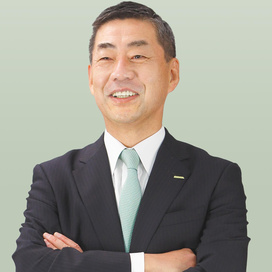 Yusuke Saraya, President SARAYA
Yusuke Saraya, President SARAYA
|
|---|
|
|
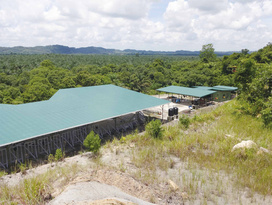 Borneo Elephant Sanctuary near Kinabatangan River in Borneo, Photo: Borneo Conservation Trust Japan.
Borneo Elephant Sanctuary near Kinabatangan River in Borneo, Photo: Borneo Conservation Trust Japan.
|
|---|
|
SARAYA’s cooperation with the Borneo Conservation Trust
| |
|---|
|
As SARAYA’s main business centers on health and hygiene, which includes a variety of hand soaps and detergents made from palm oil, it considers itself to be directly connected to the environmental burdon that palm plantations are causing on the Borneo rainforest.
|
|---|
|
|
While palm oil based detergents and soaps are biodegradable, irresponsible palm planting without any consideration for the local wildlife destroys natural habitats in Borneo. In response, SARAYA supports and gives back to Borneo by helping to establish the Borneo Conservation Trust (BCT) NGO in Malaysia and BCT Japan. They engage in protecting the Sabah Mega Ecological Corridor, including the Kinabatangan and Segama Rivers, and setting up the Borneo Elephant Sanctuary (BES), an elephant rescue and rehabilitation center. It also sponsors the BCT's activities that try to save threatened wildlife, such as the Borneo elephant and the orangutan. A recent highlight of the project was the construction and opening of the Borneo Elephant Sanctuary (BES) near the Kinabatangan River in Borneo. SARAYA supported through the addition of a supply water and a roof over the paddock. This is just the 1st stage. SARAYA will continue to support the BES in hopes to attract eco tourism with the goal of creating opportunities for local business in the area and spreading the word about Borneo conservation. SARAYA's president, Yusuke Saraya, has been on the BCT's board of directors since 2006 and became vice chairman in 2013 and will remain on for another two-year term.
| |
|---|
|
|
SARAYA’s approach of using certified palm oil of RSPO
| |
|---|
|
In 2010 SARAYA replaced all palm oil and palm kernel oil in their products to RSPO certified sustainable oil. Despite the benefits to biodiversity by using sustainable palm oil there are drawbacks. Extra premiums for certified palm oil inevitably increase costs to the consumer, making it difficult gain the support and understanding of customers for the goals of biodiversity. Speculation in sustainable palm oil also makes it difficult to find a reasonable balance in price for both oil producers and consumers. The RSPO system for sustainable palm oil production is also prohibitive towards small, private oil producers. This itself is not sustainable because only large-scale producers actively participate. These drawbacks may cause SARAYA to reconsider their current use of certified sustainable palm oil.
| |
|---|
|
|
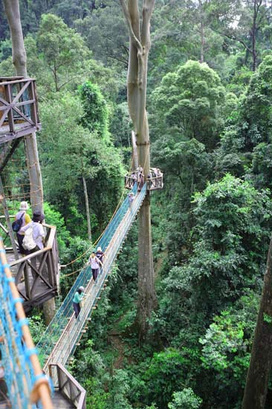 Borneo Study Tour organized by SARAYA, Photo: SARAYA
Borneo Study Tour organized by SARAYA, Photo: SARAYA
|
|---|
|
“Borneo Study Tours” as example for communication with consumers
| |
|---|
|
SARAYA has organized an annual Borneo Study Tour with its consumers every year since 2007. The company runs campaigns to educate the consumers so that they better understand the impact of their purchases on biodiversity.
|
|---|
|
|
Innovation and product development
| |
|---|
|
SARAYA developed a type of sophorolipid, a biosurfactant or environmentally sound cleaning agent, produced with yeast to ferment RSPO certified palm oil. Sophorolipid is used for products under the Happy Elephant and Soforo brands, which are a new type of ecologically sustainable home cleaning product. SARAYA has increased the number of products in the Happy Elephant lineup, and is expanding the use of Soforo in environmental applications such as the cleaning of solar panels and decontamination of radiation-affected areas. Soforo has been used for the decontamination of roads in Fukushima after the nuclear accident. The company is also conducting intensive research on the various applications of this surfactant towards more value added areas and products.
| |
|---|
|
|
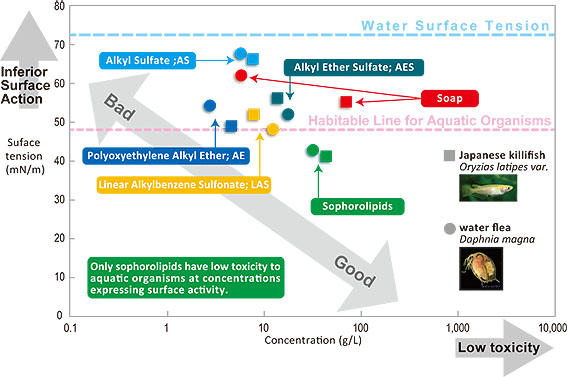 Research on the use of Soforo in environmental applications conducted by SARAYA.
Research on the use of Soforo in environmental applications conducted by SARAYA.
| |
|---|
|
|
SARAYA’s progress forward
| |
|---|
|
SARAYA believes that business can contribute towards the improvement of the world. The company incorporates these efforts through the betterment of sanitation, health, and environment. SARAYA believes that these areas are interconnected, allowing the company to help make the world a better place to live for both humans and other living things through innovation, communication and commitment. It may be a small step on the company's part, but SARAYA and other companies must make progress to ensure sustainability and biodiversity through the future.
| |
|---|
|
|
General information and contact
| |
|---|
|
SARAYA Co., Ltd is a Japanese family-run company with about 1.200 employees globally group-wide. Since its establishment in 1952, SARAYA has focused on contributing to technology and innovation in the fields of public hygiene, food sanitation, healthcare infection control and earth-friendly goods for the consumer market.
Further Information on SARAYA
Contact: Ms Atsuko Takahashi
| |
|---|
|
|
+++ BIODIVERSITY PIECES +++
| |
|---|
|
|
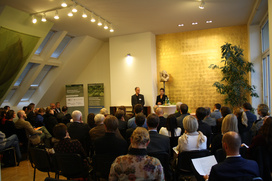 First dialogue event in Berlin last September
First dialogue event in Berlin last September
|
|---|
|
The "Discussion Forum Ecosystem Services" was launched as a series of events in Germany by the environmental NGO Deutsche Umwelthilfe (DUH), 'Biodiversity in Good Company' and two partners from academia, the Helmholtz Centre for Environmental Research (UFZ) and the German Centre for Integrative Biodiversity Research (iDiv). The second dialogue is taking place on 29 January 2015 in Berlin. For further information in German please click the link.
|
|---|
|
|
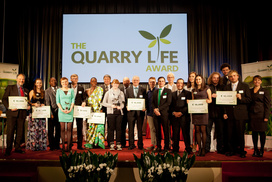 Winners of the Quarry Life Award 2014
Winners of the Quarry Life Award 2014
|
|---|
|
On 9 December 2014, the winners of the International Quarry Life Award were honored at a festive award ceremony held in Prague. The Quarry Life Award was established by HeidelbergCement to generate innovative ideas for promoting and protecting biodiversity at its quarry sites.
|
|---|
|
|
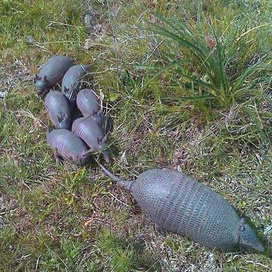 An amardillo with its offspring on the finca, copyright: ForestFinance
An amardillo with its offspring on the finca, copyright: ForestFinance
|
|---|
|
ForestFinance is supporting the WWF biodiversity survey conducted in forest projects around the Orinoco River. The finca La Paz in Colombia was chosen as one of four project areas where the pilot project “Promoting biodiversity conservation on privately managed productive forest areas and pasture land” will be implemented.
|
|---|
|
|
The Veolia Foundation supports three new projects in the field of environmental protection and biodiversity:
• The immersion of artificial nurseries to restore the marine environment in the Gulf of Beauduc in the Camargue Regional Natural Park
• Setting up a biodiversity MOOC (Massive Open Online Course) accessible to as many people as possible
• A new Red List to assess the status of ecosystems
|
|---|
|
|
|
Soil Atlas 2015
The Heinrich Böll Stiftung, the Institute for Advanced Sustainability Studies (IASS), Friends of the Earth Germany and Le Monde Diplomatique published their first soil atlas with facts and figures on agriculture, land and soils.
|
|---|
|
|
|
|